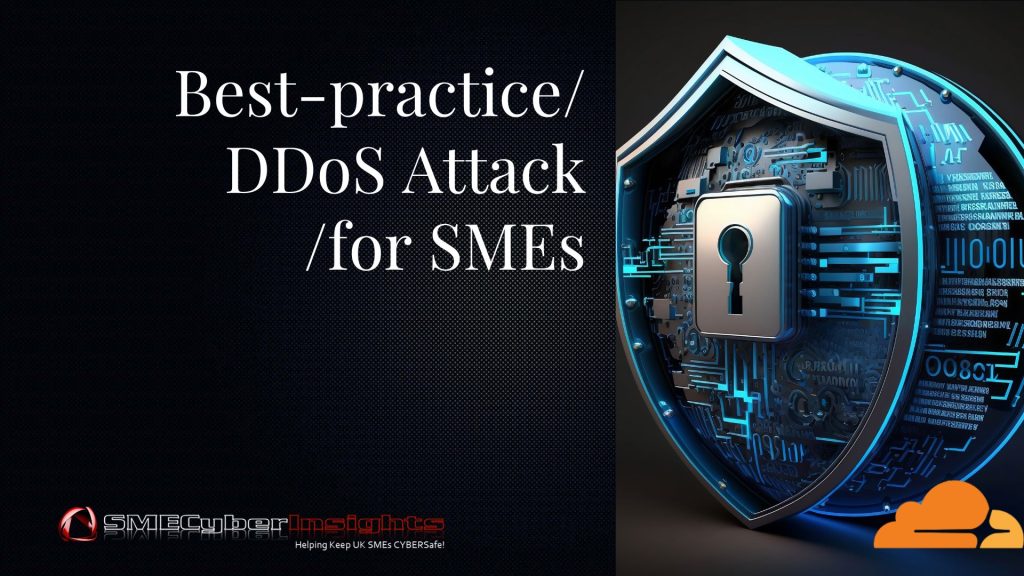DDoS ATTACK? Protecting your SMEs | CyberKPI: DDoS Attack means “Distributed Denial-of-Service (DDoS) Attack” and it is a Cybercrime in which the attacker floods a server with internet traffic to prevent users from accessing connected online services and sites. A Comprehensive Guide for Small Businesses and SMEs in the UK and EU. Discover how DDoS attacks impact small businesses, with essential insights on prevention and response strategies.
Understanding DDoS Attacks
A Distributed Denial of Service (DDoS) attack is a malicious attempt to disrupt the normal functioning of a targeted server, service, or network by overwhelming it with a flood of traffic. This is typically achieved using botnets, which are networks of compromised devices that work together to generate excessive requests, making it difficult for legitimate users to access the services. DDoS attacks can be categorised into several types, including volume-based attacks that focus on overwhelming bandwidth, protocol attacks that exploit server resources, and application layer attacks that target specific applications.
The financial implications for small businesses can be significant. The average cost of a DDoS attack can reach thousands of pounds, depending on the attack’s duration and severity. For instance, a small e-commerce site might experience a temporary shutdown due to a DDoS attack, leading to lost sales and potential long-term customer distrust.
Impact of DDoS Attacks on Small Businesses
DDoS attacks can have devastating effects on Small Businesses, particularly through data breaches that may expose sensitive customer information, leading to legal consequences. Additionally, prolonged operational downtime can damage customer trust, potentially resulting in a loss of business and increased churn rates. Many small businesses may also notice a rise in insurance premiums or face challenges in obtaining cyber insurance following a DDoS incident.
A practical example includes a small online retailer that suffers a DDoS attack during a peak shopping season. The attack not only prevents legitimate customers from accessing the website but also leads to lost revenue, negative customer experiences, and damage to the company’s reputation, which can have lasting effects long after the attack has ended.
Recognising the Signs of a DDoS Attack
Identifying the early signs of a DDoS attack is crucial for Small Businesses. A sudden influx of customer complaints regarding website accessibility can be a clear indicator of an ongoing attack. Furthermore, monitoring network analytics for unusual traffic patterns can help in spotting potential threats before they escalate into full-blown attacks. Alerts from cybersecurity tools that indicate suspicious IP addresses or excessive requests can also serve as early warning signs.
For instance, if a small business notices that its website has slowed down significantly while receiving complaints from customers, it may be a sign of a DDoS attack. Early recognition allows businesses to take preventive measures rather than dealing with the aftermath of an attack.
Preventative Measures for Small Businesses
To protect against DDoS attacks, Small Businesses can implement several preventative measures. Employing cloud-based DDoS protection services can provide scalable resources, enabling businesses to handle sudden traffic spikes effectively. Additionally, training employees to recognise Phishing attempts can help prevent attackers from gaining control over company devices, which is often a precursor to DDoS attacks. Regularly updating software and systems is also essential to close vulnerabilities that attackers might exploit.
An example of a preventative measure is a small business investing in a web application firewall (WAF). This can help filter out suspicious traffic before it reaches the server, significantly reducing the risk of a successful DDoS attack.

Effective Response Strategies During an Attack
When a Small Business is targeted by a DDoS attack, having an effective response strategy is critical. One effective approach is redirecting traffic through scrubbing centres, which filter out malicious traffic while allowing legitimate users to access the services. Additionally, maintaining clear communication with customers during an attack can help mitigate reputational damage and maintain trust. Conducting a thorough post-attack analysis can also help identify weaknesses in the DDoS response strategy, improving future preparedness.
For instance, a small online service provider that faces a DDoS attack could quickly inform its customers about the issue through social media, thereby keeping them informed and reducing frustration. This proactive communication can help preserve customer loyalty even during difficult times.
Legal Considerations and Cybersecurity Compliance
Small Businesses must be aware of their legal obligations in the event of a DDoS attack. According to the General Data Protection Regulation (GDPR), businesses are required to report data breaches to the Information Commissioner’s Office (ICO) within 72 hours. Non-compliance with cybersecurity regulations can lead to significant fines and reputational damage. Furthermore, understanding international laws regarding DDoS attacks can assist businesses in navigating potential legal issues if targeted by foreign attackers.
For example, if a small business suffers a data breach as a result of a DDoS attack, timely reporting to the ICO can mitigate some legal repercussions and demonstrate the business’s commitment to compliance.
Strategies for Long-Term DDoS Resilience
To build long-term resilience against DDoS attacks, small businesses should establish a comprehensive cybersecurity framework that includes regular training and awareness programmes for all employees. Building relationships with cybersecurity firms can also provide access to expertise and resources for DDoS mitigation. Additionally, implementing redundancy in network architecture, such as multiple data centres, can enhance resilience against potential DDoS attacks.
For instance, a Small Business might collaborate with a cybersecurity firm to conduct regular security audits and updates. This proactive approach can help the business adapt to evolving threats and maintain a robust security posture.
Red Button: The Ultimate Line of Defense Against DDoS Attacks Since 2014 – Red Button has been providing organizations with full-service testing, hardening and consulting to optimize their DDoS defenses.
With the most realistic, up-to-date DDoS attack simulations, our experts identify vulnerabilities and offer actionable recommendations for closing the gaps. We assist clients with fortifying their systems and our battle-tested Incident Response team helps mitigate attacks in real time. Red Button is an authorized DDoS test partner of both AWS and Microsoft Azure, and the developer of the industry’s DDoS Resiliency Score (DRS) standard.
CYBER Insights – Helping keep Small Business CYBERSafe!
Launched in 2020 by Cybersecurity Journalist Iain Fraser and his team at IfOnlyCommunications, CYBERInsights was developed to be the go-to platform providing definitive, reliable & actionable Cybersecurity News, Intel & Awareness Training for SMEs throughout Europe (UK & EU) as they as they further embraced new Technologies and Business Practices.













